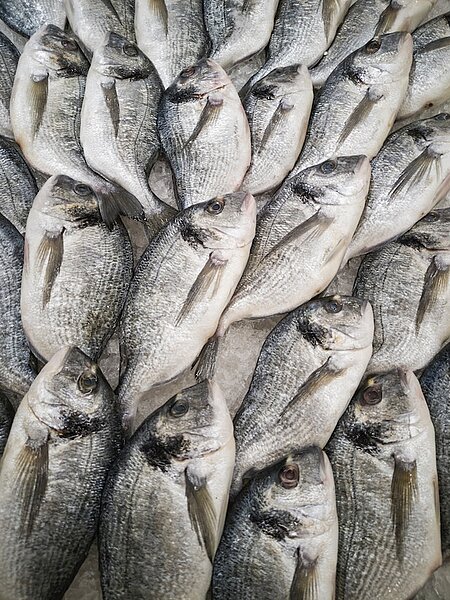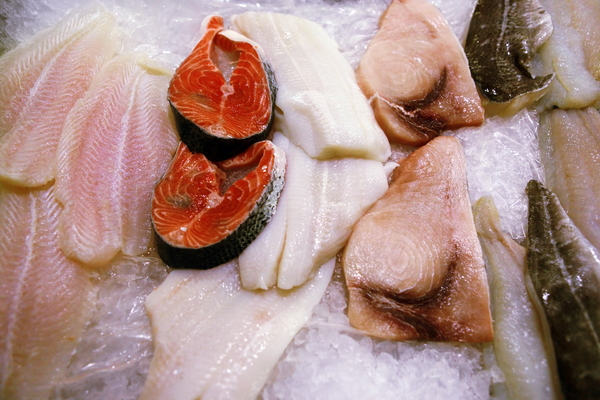Fish by-products

What are fish by-products?
The Feedstuffs Ordinance defines "fish and fish by-products" as "fish or parts of fish, fresh or preserved by an appropriate process, and by-products derived from their processing". This means that in addition to whole fish or fish fillets, other parts such as heads, bones, fins, offal or skin can also be used. These by-products are generated, for example, during the production of fish meal or fish oil, which are used as animal feed or food supplements.
What are the benefits of fish by-products?
Fish by-products are not bad or inferior per se. They can even have some benefits for your dog's diet. For example
- They contain valuable proteins that are important for muscle building and cell regeneration.
- They provide essential fatty acids such as omega-3 and omega-6 fatty acids, which have a positive effect on your dog's skin, coat and heart.
- They contain vitamins, minerals and trace elements that are important for your dog's immune system, nervous system and metabolism.
- They are often cheaper than pure fish meat and can therefore reduce the cost of dog food.
What are the disadvantages of fish by-products?
Fish by-products are not always the best choice for dog food. They can also have some disadvantages. For example
- They are often not declared exactly, so you don't know which fish species or fish parts are included. This can lead to intolerances, allergies or deficiency symptoms if, for example, your dog cannot tolerate or needs certain fish or fish ingredients.
- They can be contaminated with harmful substances such as heavy metals, pesticides or antibiotics that accumulate in the fish or in the environment. This can endanger your dog's health, especially if eaten over a long period of time.
- They may come from aquaculture, which is often associated with environmental problems such as overfishing, water pollution or animal cruelty. This can raise ethical concerns if you want to advocate for a sustainable and animal-friendly diet for your dog.
How should fish by-products in dog food be assessed?
Fish by-products are not fundamentally good or bad, but depend on the quality, origin and processing. To be able to better assess fish by-products in dog food, you should pay attention to the following points:
- The exact name of the fish by-products. The more precise the name, the better you can judge the quality and composition of the food.
Origin and quality of the fish by-products. Depending on where and how the fish were caught or farmed, they may contain more or fewer harmful substances. Therefore, look out for labels such as MSC (Marine Stewardship Council) or ASC (Aquaculture Stewardship Council), which guarantee sustainable and responsible fishing or aquaculture. - Processing and preservation of fish by-products. Depending on how fish by-products are treated, they may retain more or less nutrients and flavor.
- Careful attention should therefore be paid to gentle processes such as drying, freeze-drying or cold pressing, which preserve the natural properties of the fish by-products. You should also avoid artificial additives such as colorants, flavorings and preservatives, which can affect your dog's health.
Fish by-products can be a useful addition to a dog's diet if they come from high-quality, sustainable and carefully processed sources. They can provide your dog with important nutrients that promote his health and well-being. However, you should always pay attention to the exact declaration, origin and quality of the fish by-products to avoid possible risks. And don't forget to give your dog variety by offering other meat or plant sources that meet his needs.
Properties 6
Are you looking for other ingredients with a specific property?
Just click on them to find more.
If you notice any signs of hypersensitivity or poisoning in your dog, you should see your vet immediately. We are not a substitute for a vet, but we try to be as accurate as possible. Every dog reacts differently and we recommend you get a second opinion or consult your vet if in doubt.
Stay healthy and take good care of your four-legged friend!😊
Similar to Fish by-products
Fish by-products are all parts of the fish that are not intended for human consumption. These include, for example, heads, bones, fins, offal or skin. They are processed into fish meal or fish oil...
Plant by-products are parts of plants that are produced during the processing of food for human consumption. These include, for example, peel, stems, leaves, seeds or roots. These parts are often...
Animal by-products are all animal components of a feed that are neither meat nor animal oils, pasteurized dairy products or egg dishes. They usually come from slaughtered animals or other animals...
Fish is a collective term for all animals that live in water and have gills. There are many different types of fish, which differ in size, shape, color and habitat. Fish are vertebrates and usually...



